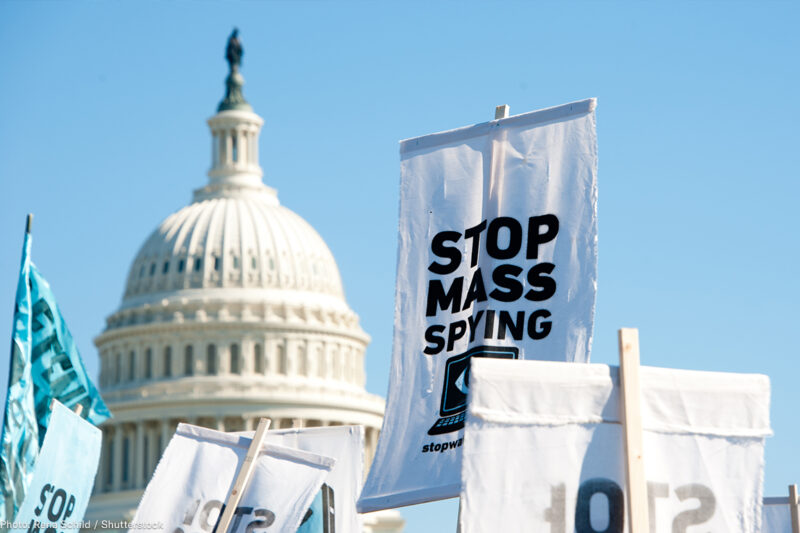Congress Finally Begins the Process of Reforming Warrantless Government Surveillance


The Trump administration wants to extend the government’s authority to spy on Americans without a warrant. Some Democrats and Republicans, recognizing the need to curb that power, are joining forces to reform the law that has been used to allow that kind of surveillance.
Rep. Bob Goodlatte, R-Va., Rep. John Conyers, D-Mich, and other members of Congress introduced a bill last week to reform Section 702 of the Foreign Intelligence Surveillance Act (FISA), which is set to expire at the end of the year.
The ACLU has long opposed Section 702 for allowing warrantless surveillance of Americans. The provision has been used to unconstitutionally collect hundreds of millions of communications every year, search all international traffic as it moves through the internet backbone, gather wholly domestic communications without a warrant, and search the trove of personal data for information unrelated to national security.
The Trump administration believes this law should be made permanent. We disagree and have urged Congress to either significantly reform the law or let it expire. The bill introduced last week is the first one this year proposing to reform Section 702. While it has positive elements, it still needs significant improvements.
Here’s our take on some of the good, the less good, and the ugly parts of the bill.
The good
The bill’s biggest step forward is that it prohibits collection of information “about” targets of investigation until 2023. The clear language of Section 702 only permits the government to collect information “to” or “from” foreign targets. The Snowden disclosure revealed, however, that the government was wrongly interpreting the law to allow it to collect international or domestic communications “about” these targets. The NSA temporarily halted about collection in April, but explicitly said that it can restart it in the future. This is particularly concerning given that that the FISA court has found that the government has persistently violated even its own procedures governing searching of these communications, resulting in significant Fourth Amendment violations.
The bill prevents this practice from restarting until 2023. This provision should be improved, however, by permanently halting this type of collected.
The less good
Much of the Section 702 debate has centered around the “backdoor search loophole.” Under Section 702, the government is prohibited from targeting citizens and US residents for surveillance. The government skirts this prohibition, however, by routinely searching the Section 702 database looking specifically for information about Americans.
An improvement over the status quo is that the bill seeks to require approval from the intelligence court for the government to view the contents of communication collected under Section 702 in some cases. However, there are concerns that the wording does not make clear that a judge – not the government – must make the appropriate probable cause funding which is needed to make this a true warrant requirement. Moreover, the exceptions to this requirement are sizable.
Among the exceptions to the requirement are circumstances in which the primary purpose is “foreign intelligence.” This means that if the NSA, CIA, NCTC, or FBI want to search for information about someone in the U.S. for the primary purpose of gathering information about topics that are broadly related to foreign affairs or national defense — like climate change, Israeli politics, drought conditions overseas, or any other — they have free rein to do so. And if through these searches they stumble across evidence of a crime, they can flag this information for criminal investigators.
Moreover, the bill does not make clear that the government is required to meet the probable cause requirement in all criminal circumstances, whether or not they are performing a search specifically looking for evidence of a crime. Thus, even in the criminal context, there is room for the government to unconstitutionally view content without a warrant.
Finally, there is no court order required to access non-content information or perform the search in the first place, and there are inadequate protections to ensure that the government does not avoid getting a warrant by falsely claiming an emergency or consent.
The ugly
The most troubling part of the bill is a provision that increases the maximum penalty for the disclosure of classified information, including by whistleblowers. It also creates an entirely new crime that could be used to punish people who accidentally mishandle classified information, including in cases where they did not know the information they had was classified or they take corrective action.
Finally, the bill fails to address a number of problems with existing law. For example, it continues to permit the government to spy on individuals without a warrant who are not suspected of any wrongdoing, including based simply on the fact that they might have information related to foreign affairs or national defense. It does not ensure that individuals receive notice when Section 702 information is used against them, despite ample evidence that the government has failed to provide adequate notice to criminal defendants. And it does not force the NSA to fulfill its promise made earlier this year to provide an estimate of the number of people in the U.S. whose information is collected under this authority.
The bill is a start, but it does not go far enough to protect individual from warrantless surveillance. Congress must take steps to address the bill’s deficiencies as it moves forward.
Stay informed
Sign up to be the first to hear about how to take action.
By completing this form, I agree to receive occasional emails per the terms of the ACLU's privacy statement.
By completing this form, I agree to receive occasional emails per the terms of the ACLU's privacy statement.

